Analysis of Entrepreneurial Mindsets and Personality
VerifiedAdded on 2020/10/22
|19
|5438
|368
AI Summary
The provided text is an academic assignment that requires students to analyze various studies and research papers on entrepreneurial mindsets, personality, and related topics. The task involves understanding the importance of passion in entrepreneurship, situated cognition, government support for high-tech startups, typologies of difference and identity, and distinguishing types of entrepreneurial ventures. Students are also expected to engage with resources such as books (e.g., 'Entrepreneurship and small business' by P. Burns), journals (e.g., 'Journal of Small Business Management'), and online articles (e.g., '10 Mindsets of Successful Entrepreneurs'). The assignment aims to develop students' understanding of the complexities involved in entrepreneurship and the various factors that contribute to its success.
Contribute Materials
Your contribution can guide someone’s learning journey. Share your
documents today.
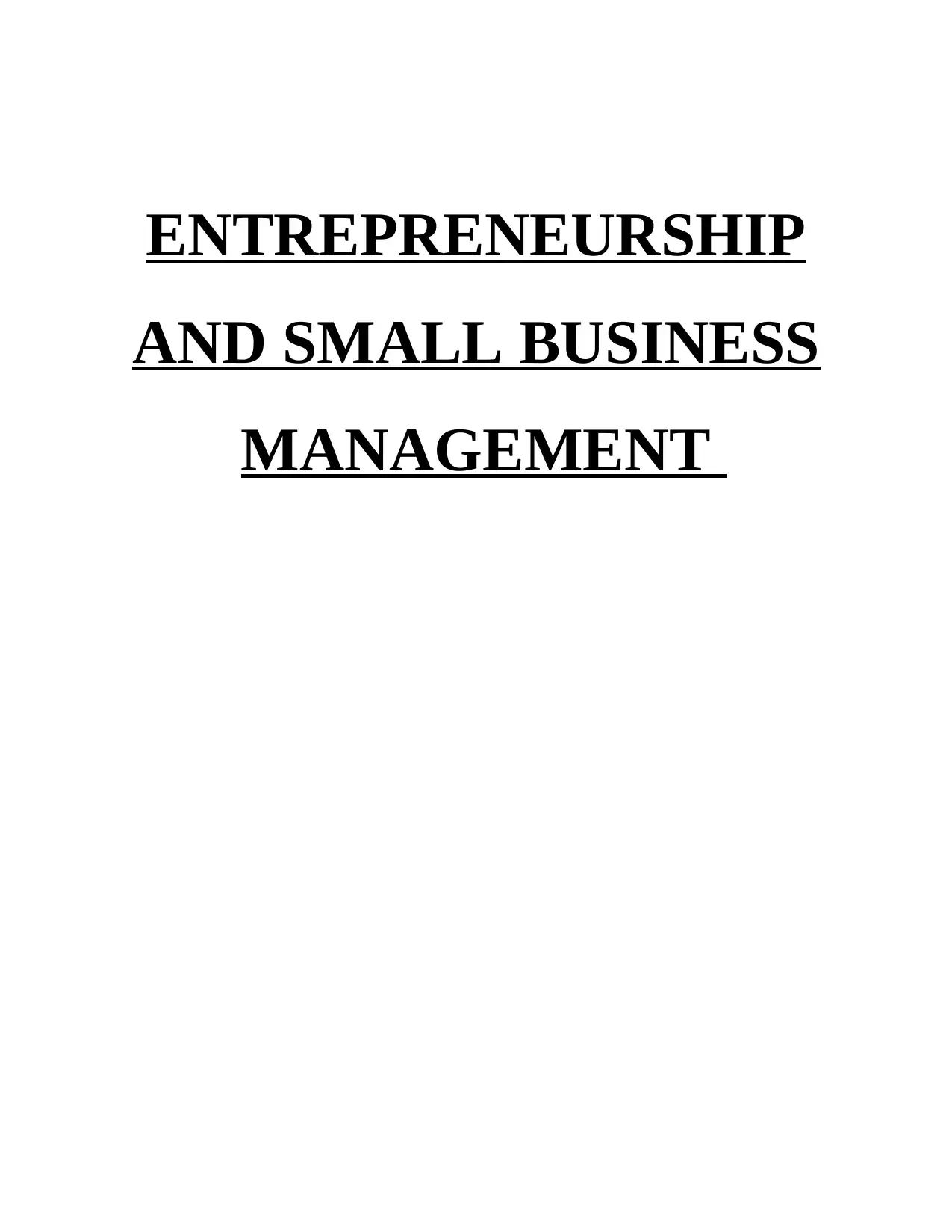
ENTREPRENEURSHIP
AND SMALL BUSINESS
MANAGEMENT
AND SMALL BUSINESS
MANAGEMENT
Secure Best Marks with AI Grader
Need help grading? Try our AI Grader for instant feedback on your assignments.
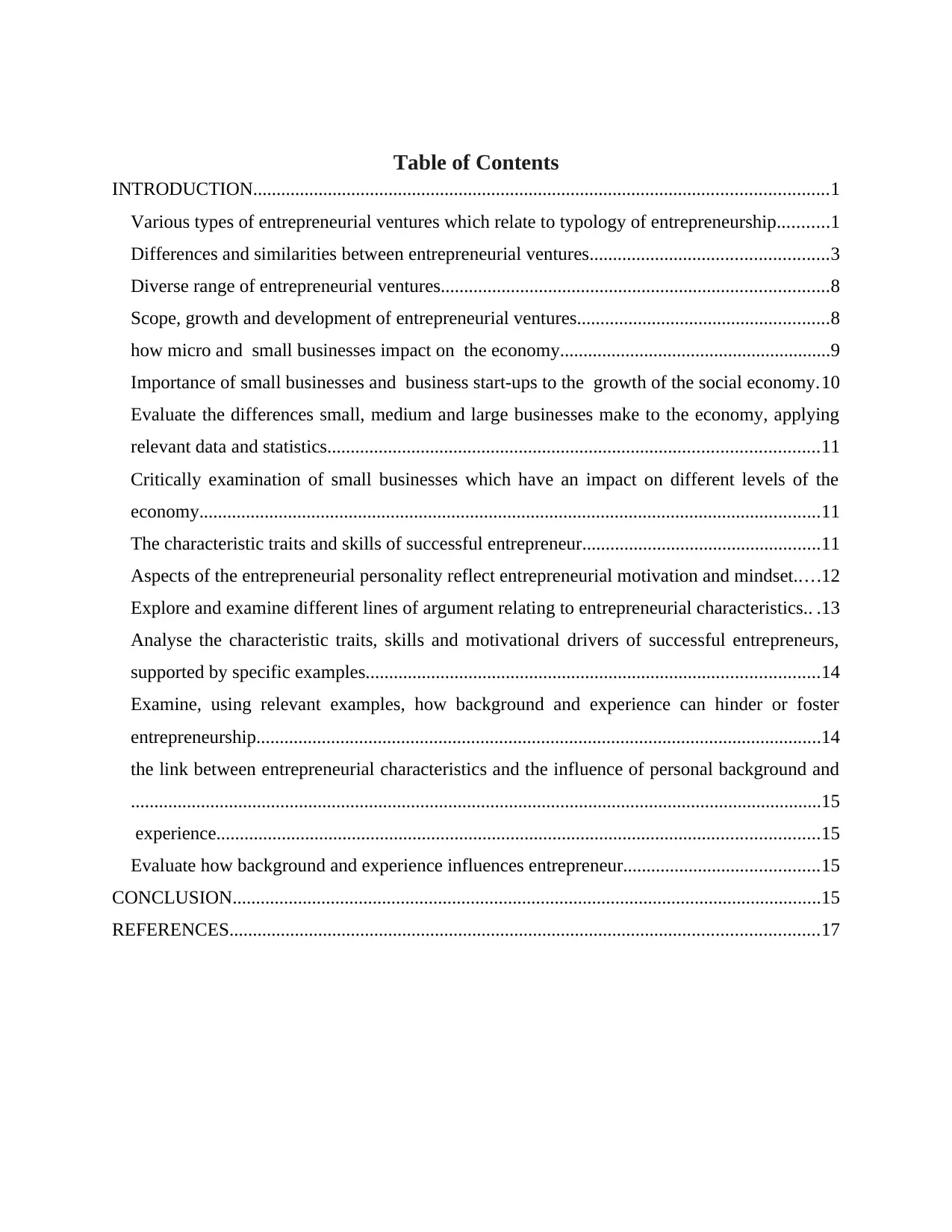
Table of Contents
INTRODUCTION...........................................................................................................................1
Various types of entrepreneurial ventures which relate to typology of entrepreneurship...........1
Differences and similarities between entrepreneurial ventures...................................................3
Diverse range of entrepreneurial ventures...................................................................................8
Scope, growth and development of entrepreneurial ventures......................................................8
how micro and small businesses impact on the economy..........................................................9
Importance of small businesses and business start-ups to the growth of the social economy.10
Evaluate the differences small, medium and large businesses make to the economy, applying
relevant data and statistics.........................................................................................................11
Critically examination of small businesses which have an impact on different levels of the
economy.....................................................................................................................................11
The characteristic traits and skills of successful entrepreneur...................................................11
Aspects of the entrepreneurial personality reflect entrepreneurial motivation and mindset.....12
Explore and examine different lines of argument relating to entrepreneurial characteristics.. .13
Analyse the characteristic traits, skills and motivational drivers of successful entrepreneurs,
supported by specific examples.................................................................................................14
Examine, using relevant examples, how background and experience can hinder or foster
entrepreneurship.........................................................................................................................14
the link between entrepreneurial characteristics and the influence of personal background and
....................................................................................................................................................15
experience.................................................................................................................................15
Evaluate how background and experience influences entrepreneur..........................................15
CONCLUSION..............................................................................................................................15
REFERENCES..............................................................................................................................17
INTRODUCTION...........................................................................................................................1
Various types of entrepreneurial ventures which relate to typology of entrepreneurship...........1
Differences and similarities between entrepreneurial ventures...................................................3
Diverse range of entrepreneurial ventures...................................................................................8
Scope, growth and development of entrepreneurial ventures......................................................8
how micro and small businesses impact on the economy..........................................................9
Importance of small businesses and business start-ups to the growth of the social economy.10
Evaluate the differences small, medium and large businesses make to the economy, applying
relevant data and statistics.........................................................................................................11
Critically examination of small businesses which have an impact on different levels of the
economy.....................................................................................................................................11
The characteristic traits and skills of successful entrepreneur...................................................11
Aspects of the entrepreneurial personality reflect entrepreneurial motivation and mindset.....12
Explore and examine different lines of argument relating to entrepreneurial characteristics.. .13
Analyse the characteristic traits, skills and motivational drivers of successful entrepreneurs,
supported by specific examples.................................................................................................14
Examine, using relevant examples, how background and experience can hinder or foster
entrepreneurship.........................................................................................................................14
the link between entrepreneurial characteristics and the influence of personal background and
....................................................................................................................................................15
experience.................................................................................................................................15
Evaluate how background and experience influences entrepreneur..........................................15
CONCLUSION..............................................................................................................................15
REFERENCES..............................................................................................................................17
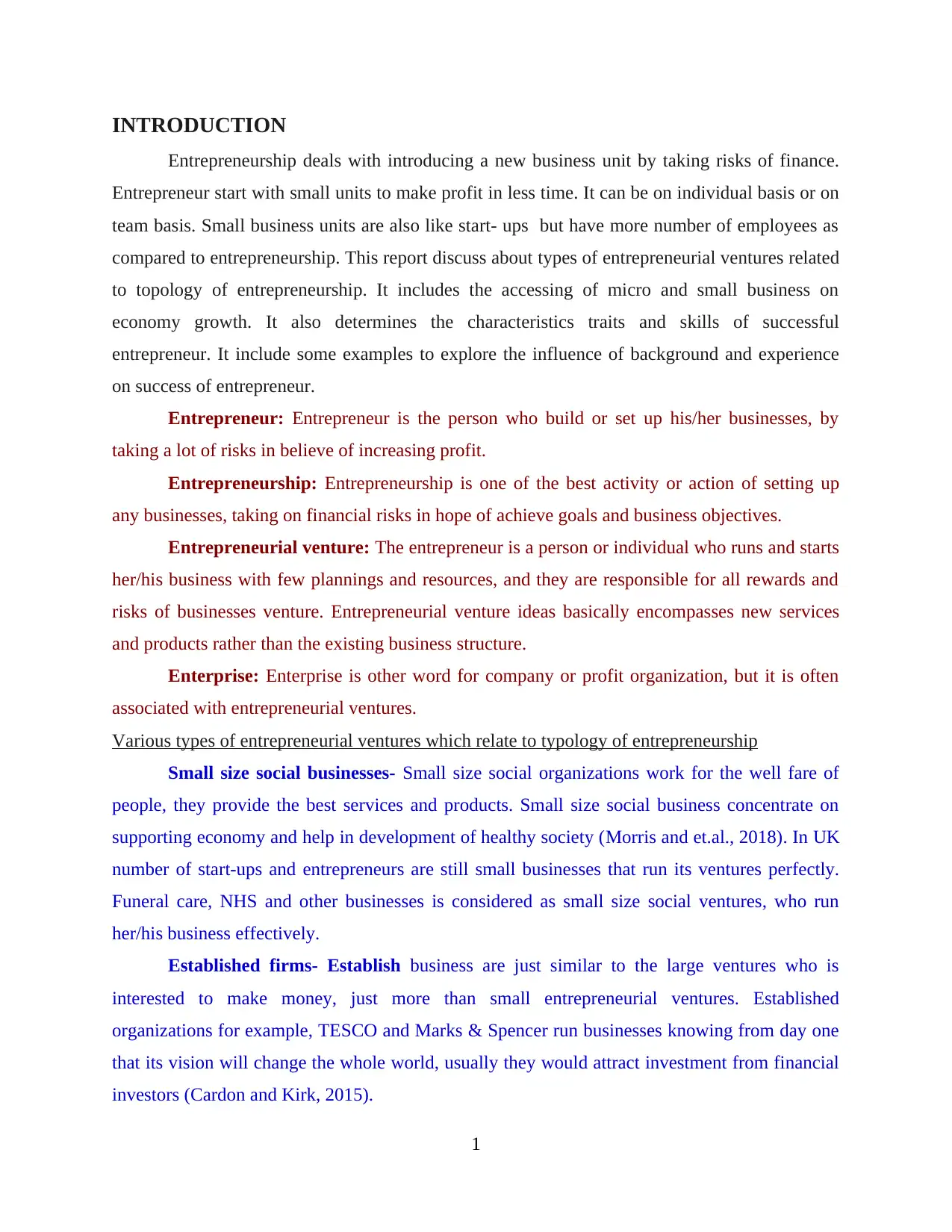
INTRODUCTION
Entrepreneurship deals with introducing a new business unit by taking risks of finance.
Entrepreneur start with small units to make profit in less time. It can be on individual basis or on
team basis. Small business units are also like start- ups but have more number of employees as
compared to entrepreneurship. This report discuss about types of entrepreneurial ventures related
to topology of entrepreneurship. It includes the accessing of micro and small business on
economy growth. It also determines the characteristics traits and skills of successful
entrepreneur. It include some examples to explore the influence of background and experience
on success of entrepreneur.
Entrepreneur: Entrepreneur is the person who build or set up his/her businesses, by
taking a lot of risks in believe of increasing profit.
Entrepreneurship: Entrepreneurship is one of the best activity or action of setting up
any businesses, taking on financial risks in hope of achieve goals and business objectives.
Entrepreneurial venture: The entrepreneur is a person or individual who runs and starts
her/his business with few plannings and resources, and they are responsible for all rewards and
risks of businesses venture. Entrepreneurial venture ideas basically encompasses new services
and products rather than the existing business structure.
Enterprise: Enterprise is other word for company or profit organization, but it is often
associated with entrepreneurial ventures.
Various types of entrepreneurial ventures which relate to typology of entrepreneurship
Small size social businesses- Small size social organizations work for the well fare of
people, they provide the best services and products. Small size social business concentrate on
supporting economy and help in development of healthy society (Morris and et.al., 2018). In UK
number of start-ups and entrepreneurs are still small businesses that run its ventures perfectly.
Funeral care, NHS and other businesses is considered as small size social ventures, who run
her/his business effectively.
Established firms- Establish business are just similar to the large ventures who is
interested to make money, just more than small entrepreneurial ventures. Established
organizations for example, TESCO and Marks & Spencer run businesses knowing from day one
that its vision will change the whole world, usually they would attract investment from financial
investors (Cardon and Kirk, 2015).
1
Entrepreneurship deals with introducing a new business unit by taking risks of finance.
Entrepreneur start with small units to make profit in less time. It can be on individual basis or on
team basis. Small business units are also like start- ups but have more number of employees as
compared to entrepreneurship. This report discuss about types of entrepreneurial ventures related
to topology of entrepreneurship. It includes the accessing of micro and small business on
economy growth. It also determines the characteristics traits and skills of successful
entrepreneur. It include some examples to explore the influence of background and experience
on success of entrepreneur.
Entrepreneur: Entrepreneur is the person who build or set up his/her businesses, by
taking a lot of risks in believe of increasing profit.
Entrepreneurship: Entrepreneurship is one of the best activity or action of setting up
any businesses, taking on financial risks in hope of achieve goals and business objectives.
Entrepreneurial venture: The entrepreneur is a person or individual who runs and starts
her/his business with few plannings and resources, and they are responsible for all rewards and
risks of businesses venture. Entrepreneurial venture ideas basically encompasses new services
and products rather than the existing business structure.
Enterprise: Enterprise is other word for company or profit organization, but it is often
associated with entrepreneurial ventures.
Various types of entrepreneurial ventures which relate to typology of entrepreneurship
Small size social businesses- Small size social organizations work for the well fare of
people, they provide the best services and products. Small size social business concentrate on
supporting economy and help in development of healthy society (Morris and et.al., 2018). In UK
number of start-ups and entrepreneurs are still small businesses that run its ventures perfectly.
Funeral care, NHS and other businesses is considered as small size social ventures, who run
her/his business effectively.
Established firms- Establish business are just similar to the large ventures who is
interested to make money, just more than small entrepreneurial ventures. Established
organizations for example, TESCO and Marks & Spencer run businesses knowing from day one
that its vision will change the whole world, usually they would attract investment from financial
investors (Cardon and Kirk, 2015).
1
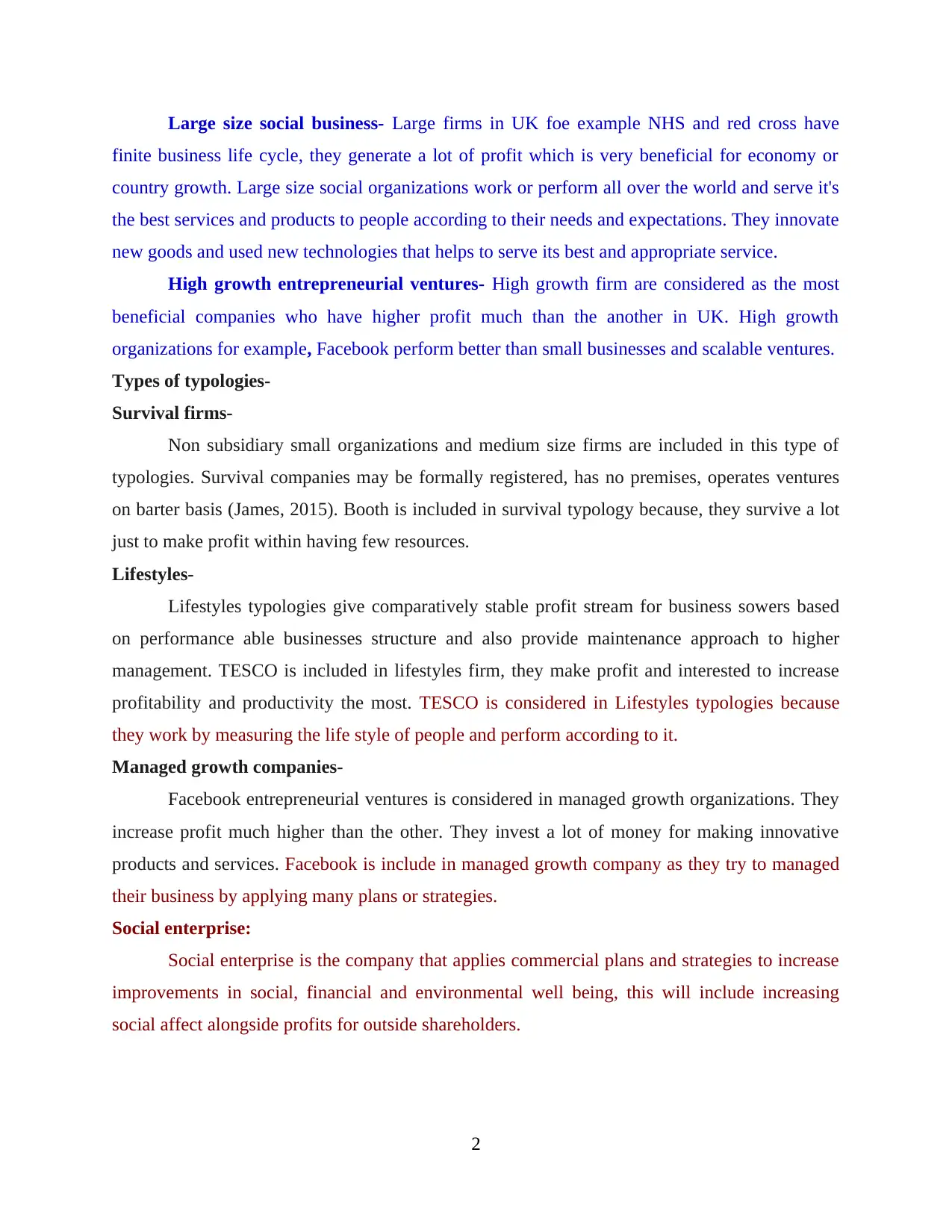
Large size social business- Large firms in UK foe example NHS and red cross have
finite business life cycle, they generate a lot of profit which is very beneficial for economy or
country growth. Large size social organizations work or perform all over the world and serve it's
the best services and products to people according to their needs and expectations. They innovate
new goods and used new technologies that helps to serve its best and appropriate service.
High growth entrepreneurial ventures- High growth firm are considered as the most
beneficial companies who have higher profit much than the another in UK. High growth
organizations for example, Facebook perform better than small businesses and scalable ventures.
Types of typologies-
Survival firms-
Non subsidiary small organizations and medium size firms are included in this type of
typologies. Survival companies may be formally registered, has no premises, operates ventures
on barter basis (James, 2015). Booth is included in survival typology because, they survive a lot
just to make profit within having few resources.
Lifestyles-
Lifestyles typologies give comparatively stable profit stream for business sowers based
on performance able businesses structure and also provide maintenance approach to higher
management. TESCO is included in lifestyles firm, they make profit and interested to increase
profitability and productivity the most. TESCO is considered in Lifestyles typologies because
they work by measuring the life style of people and perform according to it.
Managed growth companies-
Facebook entrepreneurial ventures is considered in managed growth organizations. They
increase profit much higher than the other. They invest a lot of money for making innovative
products and services. Facebook is include in managed growth company as they try to managed
their business by applying many plans or strategies.
Social enterprise:
Social enterprise is the company that applies commercial plans and strategies to increase
improvements in social, financial and environmental well being, this will include increasing
social affect alongside profits for outside shareholders.
2
finite business life cycle, they generate a lot of profit which is very beneficial for economy or
country growth. Large size social organizations work or perform all over the world and serve it's
the best services and products to people according to their needs and expectations. They innovate
new goods and used new technologies that helps to serve its best and appropriate service.
High growth entrepreneurial ventures- High growth firm are considered as the most
beneficial companies who have higher profit much than the another in UK. High growth
organizations for example, Facebook perform better than small businesses and scalable ventures.
Types of typologies-
Survival firms-
Non subsidiary small organizations and medium size firms are included in this type of
typologies. Survival companies may be formally registered, has no premises, operates ventures
on barter basis (James, 2015). Booth is included in survival typology because, they survive a lot
just to make profit within having few resources.
Lifestyles-
Lifestyles typologies give comparatively stable profit stream for business sowers based
on performance able businesses structure and also provide maintenance approach to higher
management. TESCO is included in lifestyles firm, they make profit and interested to increase
profitability and productivity the most. TESCO is considered in Lifestyles typologies because
they work by measuring the life style of people and perform according to it.
Managed growth companies-
Facebook entrepreneurial ventures is considered in managed growth organizations. They
increase profit much higher than the other. They invest a lot of money for making innovative
products and services. Facebook is include in managed growth company as they try to managed
their business by applying many plans or strategies.
Social enterprise:
Social enterprise is the company that applies commercial plans and strategies to increase
improvements in social, financial and environmental well being, this will include increasing
social affect alongside profits for outside shareholders.
2
Secure Best Marks with AI Grader
Need help grading? Try our AI Grader for instant feedback on your assignments.
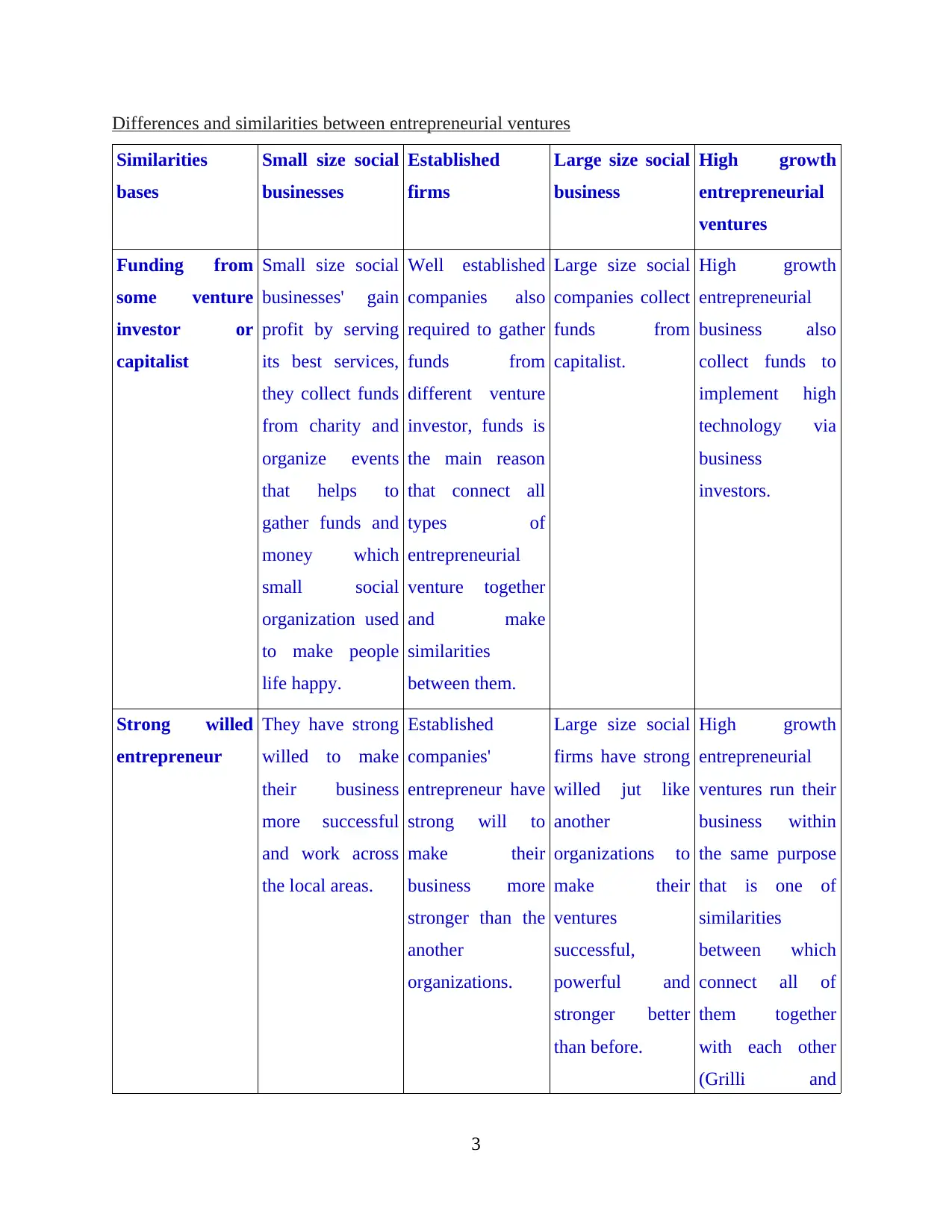
Differences and similarities between entrepreneurial ventures
Similarities
bases
Small size social
businesses
Established
firms
Large size social
business
High growth
entrepreneurial
ventures
Funding from
some venture
investor or
capitalist
Small size social
businesses' gain
profit by serving
its best services,
they collect funds
from charity and
organize events
that helps to
gather funds and
money which
small social
organization used
to make people
life happy.
Well established
companies also
required to gather
funds from
different venture
investor, funds is
the main reason
that connect all
types of
entrepreneurial
venture together
and make
similarities
between them.
Large size social
companies collect
funds from
capitalist.
High growth
entrepreneurial
business also
collect funds to
implement high
technology via
business
investors.
Strong willed
entrepreneur
They have strong
willed to make
their business
more successful
and work across
the local areas.
Established
companies'
entrepreneur have
strong will to
make their
business more
stronger than the
another
organizations.
Large size social
firms have strong
willed jut like
another
organizations to
make their
ventures
successful,
powerful and
stronger better
than before.
High growth
entrepreneurial
ventures run their
business within
the same purpose
that is one of
similarities
between which
connect all of
them together
with each other
(Grilli and
3
Similarities
bases
Small size social
businesses
Established
firms
Large size social
business
High growth
entrepreneurial
ventures
Funding from
some venture
investor or
capitalist
Small size social
businesses' gain
profit by serving
its best services,
they collect funds
from charity and
organize events
that helps to
gather funds and
money which
small social
organization used
to make people
life happy.
Well established
companies also
required to gather
funds from
different venture
investor, funds is
the main reason
that connect all
types of
entrepreneurial
venture together
and make
similarities
between them.
Large size social
companies collect
funds from
capitalist.
High growth
entrepreneurial
business also
collect funds to
implement high
technology via
business
investors.
Strong willed
entrepreneur
They have strong
willed to make
their business
more successful
and work across
the local areas.
Established
companies'
entrepreneur have
strong will to
make their
business more
stronger than the
another
organizations.
Large size social
firms have strong
willed jut like
another
organizations to
make their
ventures
successful,
powerful and
stronger better
than before.
High growth
entrepreneurial
ventures run their
business within
the same purpose
that is one of
similarities
between which
connect all of
them together
with each other
(Grilli and
3
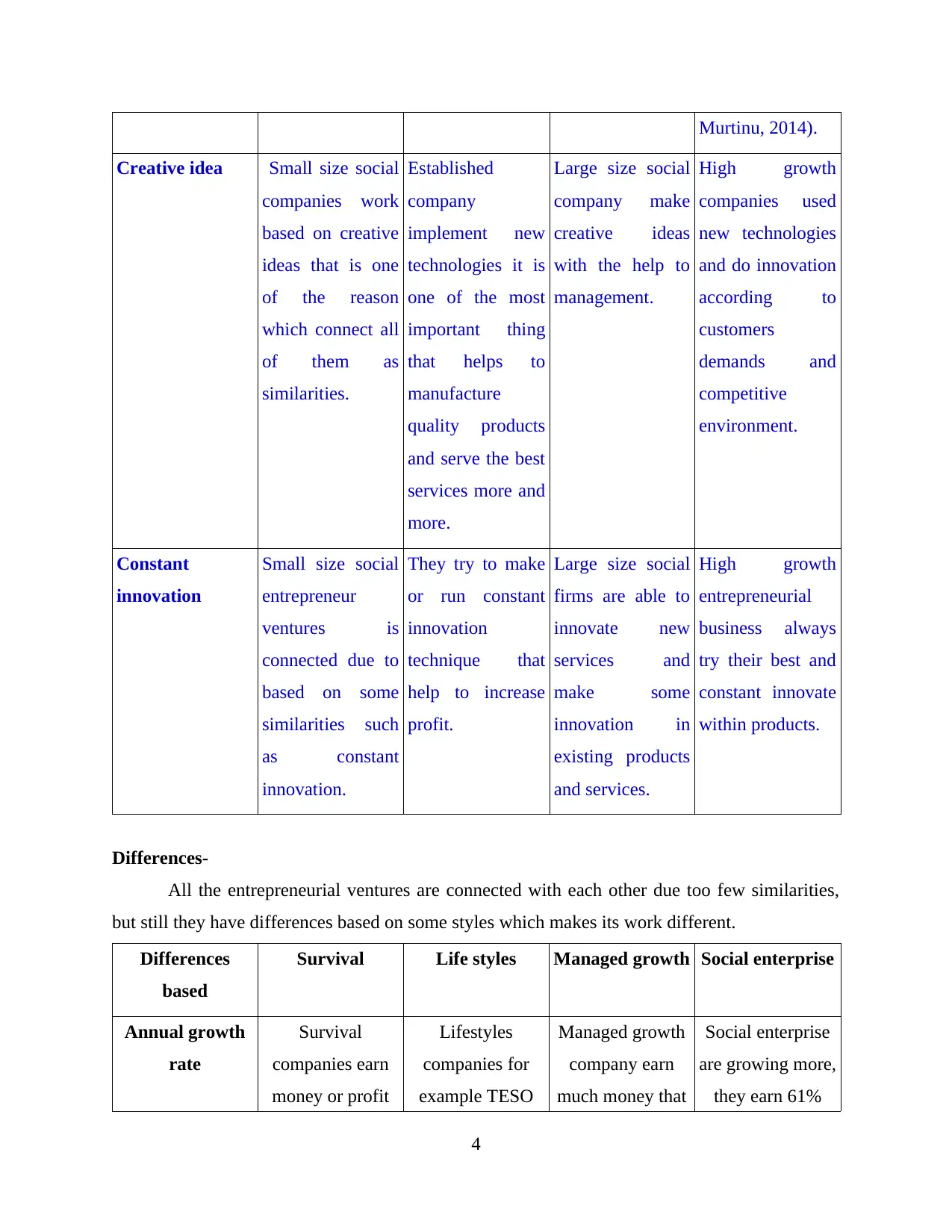
Murtinu, 2014).
Creative idea Small size social
companies work
based on creative
ideas that is one
of the reason
which connect all
of them as
similarities.
Established
company
implement new
technologies it is
one of the most
important thing
that helps to
manufacture
quality products
and serve the best
services more and
more.
Large size social
company make
creative ideas
with the help to
management.
High growth
companies used
new technologies
and do innovation
according to
customers
demands and
competitive
environment.
Constant
innovation
Small size social
entrepreneur
ventures is
connected due to
based on some
similarities such
as constant
innovation.
They try to make
or run constant
innovation
technique that
help to increase
profit.
Large size social
firms are able to
innovate new
services and
make some
innovation in
existing products
and services.
High growth
entrepreneurial
business always
try their best and
constant innovate
within products.
Differences-
All the entrepreneurial ventures are connected with each other due too few similarities,
but still they have differences based on some styles which makes its work different.
Differences
based
Survival Life styles Managed growth Social enterprise
Annual growth
rate
Survival
companies earn
money or profit
Lifestyles
companies for
example TESO
Managed growth
company earn
much money that
Social enterprise
are growing more,
they earn 61%
4
Creative idea Small size social
companies work
based on creative
ideas that is one
of the reason
which connect all
of them as
similarities.
Established
company
implement new
technologies it is
one of the most
important thing
that helps to
manufacture
quality products
and serve the best
services more and
more.
Large size social
company make
creative ideas
with the help to
management.
High growth
companies used
new technologies
and do innovation
according to
customers
demands and
competitive
environment.
Constant
innovation
Small size social
entrepreneur
ventures is
connected due to
based on some
similarities such
as constant
innovation.
They try to make
or run constant
innovation
technique that
help to increase
profit.
Large size social
firms are able to
innovate new
services and
make some
innovation in
existing products
and services.
High growth
entrepreneurial
business always
try their best and
constant innovate
within products.
Differences-
All the entrepreneurial ventures are connected with each other due too few similarities,
but still they have differences based on some styles which makes its work different.
Differences
based
Survival Life styles Managed growth Social enterprise
Annual growth
rate
Survival
companies earn
money or profit
Lifestyles
companies for
example TESO
Managed growth
company earn
much money that
Social enterprise
are growing more,
they earn 61%
4
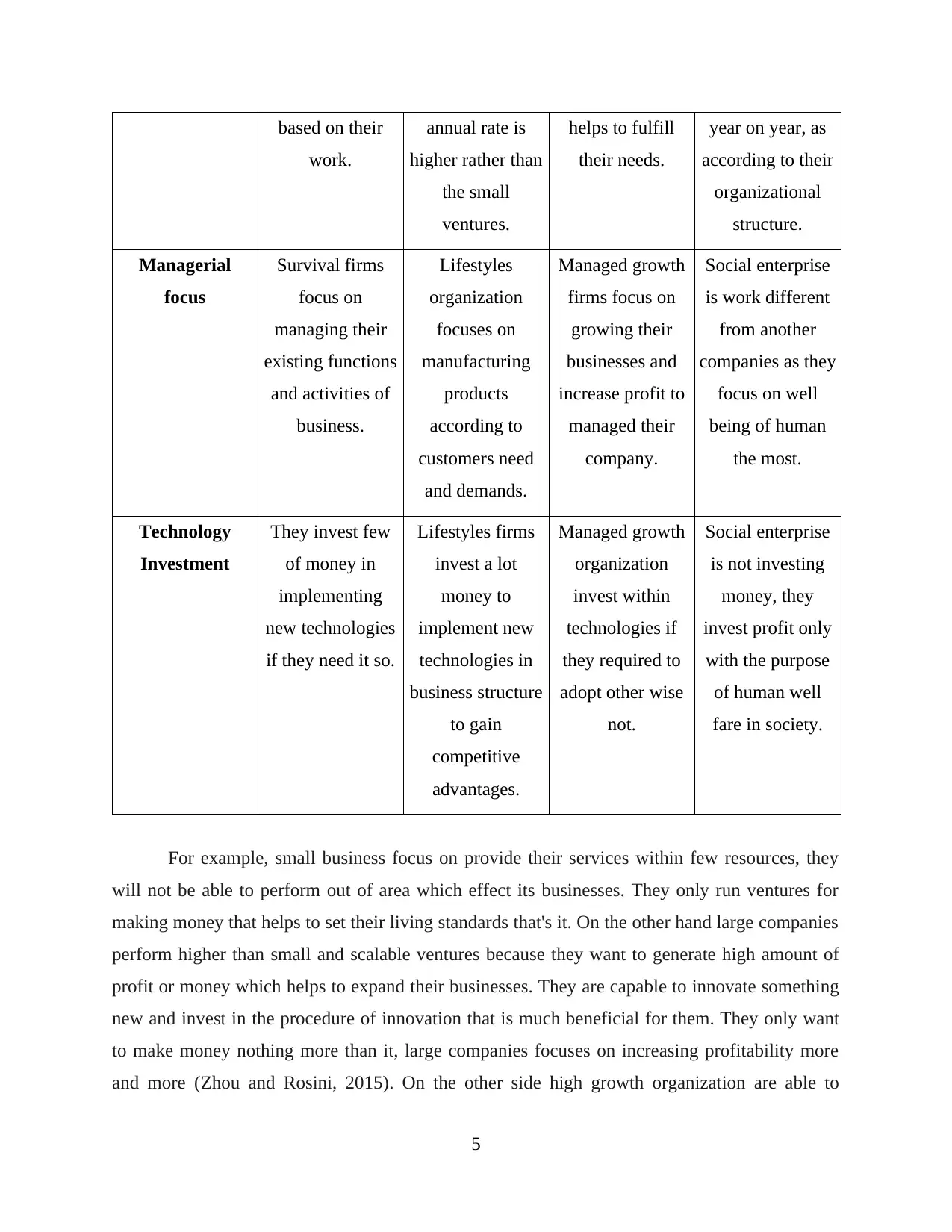
based on their
work.
annual rate is
higher rather than
the small
ventures.
helps to fulfill
their needs.
year on year, as
according to their
organizational
structure.
Managerial
focus
Survival firms
focus on
managing their
existing functions
and activities of
business.
Lifestyles
organization
focuses on
manufacturing
products
according to
customers need
and demands.
Managed growth
firms focus on
growing their
businesses and
increase profit to
managed their
company.
Social enterprise
is work different
from another
companies as they
focus on well
being of human
the most.
Technology
Investment
They invest few
of money in
implementing
new technologies
if they need it so.
Lifestyles firms
invest a lot
money to
implement new
technologies in
business structure
to gain
competitive
advantages.
Managed growth
organization
invest within
technologies if
they required to
adopt other wise
not.
Social enterprise
is not investing
money, they
invest profit only
with the purpose
of human well
fare in society.
For example, small business focus on provide their services within few resources, they
will not be able to perform out of area which effect its businesses. They only run ventures for
making money that helps to set their living standards that's it. On the other hand large companies
perform higher than small and scalable ventures because they want to generate high amount of
profit or money which helps to expand their businesses. They are capable to innovate something
new and invest in the procedure of innovation that is much beneficial for them. They only want
to make money nothing more than it, large companies focuses on increasing profitability more
and more (Zhou and Rosini, 2015). On the other side high growth organization are able to
5
work.
annual rate is
higher rather than
the small
ventures.
helps to fulfill
their needs.
year on year, as
according to their
organizational
structure.
Managerial
focus
Survival firms
focus on
managing their
existing functions
and activities of
business.
Lifestyles
organization
focuses on
manufacturing
products
according to
customers need
and demands.
Managed growth
firms focus on
growing their
businesses and
increase profit to
managed their
company.
Social enterprise
is work different
from another
companies as they
focus on well
being of human
the most.
Technology
Investment
They invest few
of money in
implementing
new technologies
if they need it so.
Lifestyles firms
invest a lot
money to
implement new
technologies in
business structure
to gain
competitive
advantages.
Managed growth
organization
invest within
technologies if
they required to
adopt other wise
not.
Social enterprise
is not investing
money, they
invest profit only
with the purpose
of human well
fare in society.
For example, small business focus on provide their services within few resources, they
will not be able to perform out of area which effect its businesses. They only run ventures for
making money that helps to set their living standards that's it. On the other hand large companies
perform higher than small and scalable ventures because they want to generate high amount of
profit or money which helps to expand their businesses. They are capable to innovate something
new and invest in the procedure of innovation that is much beneficial for them. They only want
to make money nothing more than it, large companies focuses on increasing profitability more
and more (Zhou and Rosini, 2015). On the other side high growth organization are able to
5
Paraphrase This Document
Need a fresh take? Get an instant paraphrase of this document with our AI Paraphraser
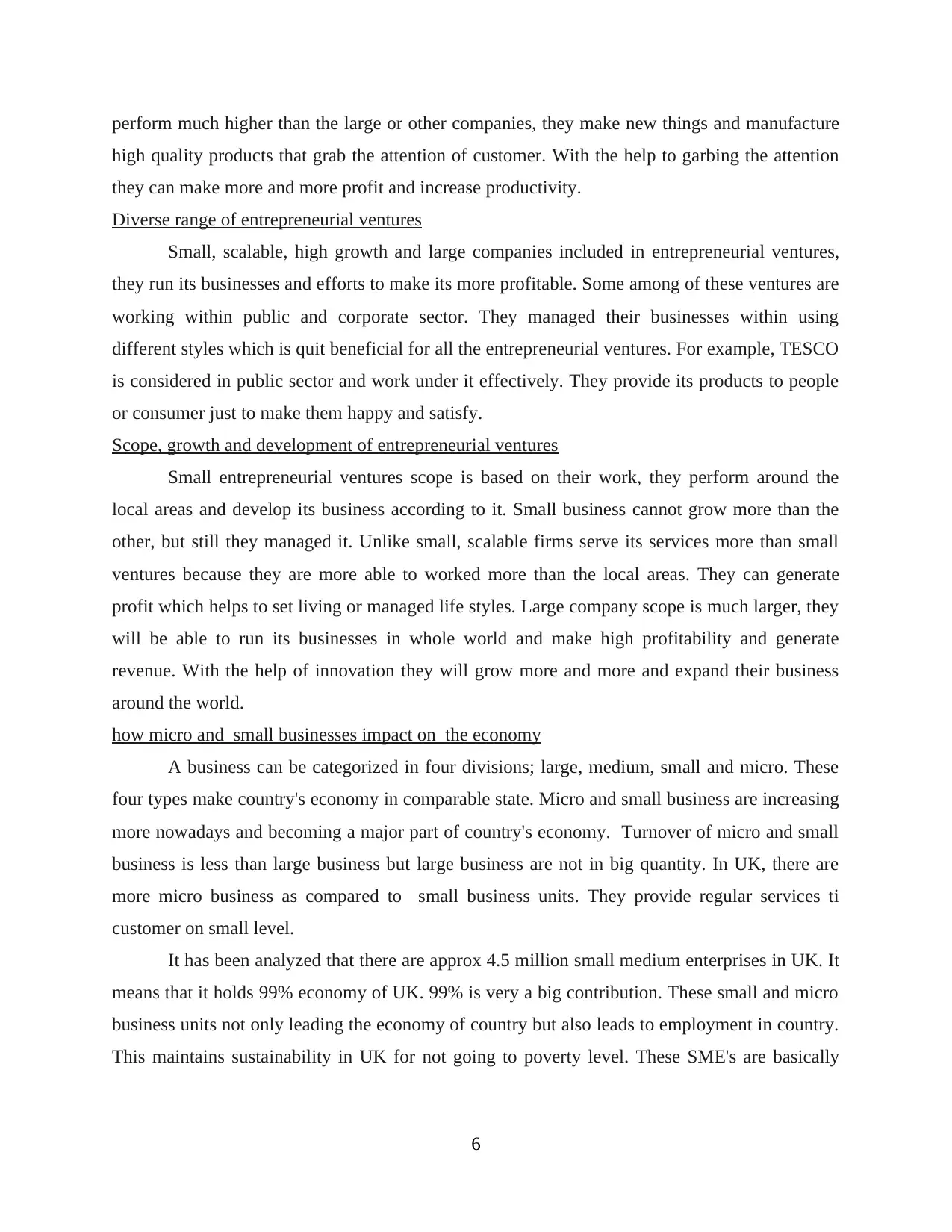
perform much higher than the large or other companies, they make new things and manufacture
high quality products that grab the attention of customer. With the help to garbing the attention
they can make more and more profit and increase productivity.
Diverse range of entrepreneurial ventures
Small, scalable, high growth and large companies included in entrepreneurial ventures,
they run its businesses and efforts to make its more profitable. Some among of these ventures are
working within public and corporate sector. They managed their businesses within using
different styles which is quit beneficial for all the entrepreneurial ventures. For example, TESCO
is considered in public sector and work under it effectively. They provide its products to people
or consumer just to make them happy and satisfy.
Scope, growth and development of entrepreneurial ventures
Small entrepreneurial ventures scope is based on their work, they perform around the
local areas and develop its business according to it. Small business cannot grow more than the
other, but still they managed it. Unlike small, scalable firms serve its services more than small
ventures because they are more able to worked more than the local areas. They can generate
profit which helps to set living or managed life styles. Large company scope is much larger, they
will be able to run its businesses in whole world and make high profitability and generate
revenue. With the help of innovation they will grow more and more and expand their business
around the world.
how micro and small businesses impact on the economy
A business can be categorized in four divisions; large, medium, small and micro. These
four types make country's economy in comparable state. Micro and small business are increasing
more nowadays and becoming a major part of country's economy. Turnover of micro and small
business is less than large business but large business are not in big quantity. In UK, there are
more micro business as compared to small business units. They provide regular services ti
customer on small level.
It has been analyzed that there are approx 4.5 million small medium enterprises in UK. It
means that it holds 99% economy of UK. 99% is very a big contribution. These small and micro
business units not only leading the economy of country but also leads to employment in country.
This maintains sustainability in UK for not going to poverty level. These SME's are basically
6
high quality products that grab the attention of customer. With the help to garbing the attention
they can make more and more profit and increase productivity.
Diverse range of entrepreneurial ventures
Small, scalable, high growth and large companies included in entrepreneurial ventures,
they run its businesses and efforts to make its more profitable. Some among of these ventures are
working within public and corporate sector. They managed their businesses within using
different styles which is quit beneficial for all the entrepreneurial ventures. For example, TESCO
is considered in public sector and work under it effectively. They provide its products to people
or consumer just to make them happy and satisfy.
Scope, growth and development of entrepreneurial ventures
Small entrepreneurial ventures scope is based on their work, they perform around the
local areas and develop its business according to it. Small business cannot grow more than the
other, but still they managed it. Unlike small, scalable firms serve its services more than small
ventures because they are more able to worked more than the local areas. They can generate
profit which helps to set living or managed life styles. Large company scope is much larger, they
will be able to run its businesses in whole world and make high profitability and generate
revenue. With the help of innovation they will grow more and more and expand their business
around the world.
how micro and small businesses impact on the economy
A business can be categorized in four divisions; large, medium, small and micro. These
four types make country's economy in comparable state. Micro and small business are increasing
more nowadays and becoming a major part of country's economy. Turnover of micro and small
business is less than large business but large business are not in big quantity. In UK, there are
more micro business as compared to small business units. They provide regular services ti
customer on small level.
It has been analyzed that there are approx 4.5 million small medium enterprises in UK. It
means that it holds 99% economy of UK. 99% is very a big contribution. These small and micro
business units not only leading the economy of country but also leads to employment in country.
This maintains sustainability in UK for not going to poverty level. These SME's are basically
6
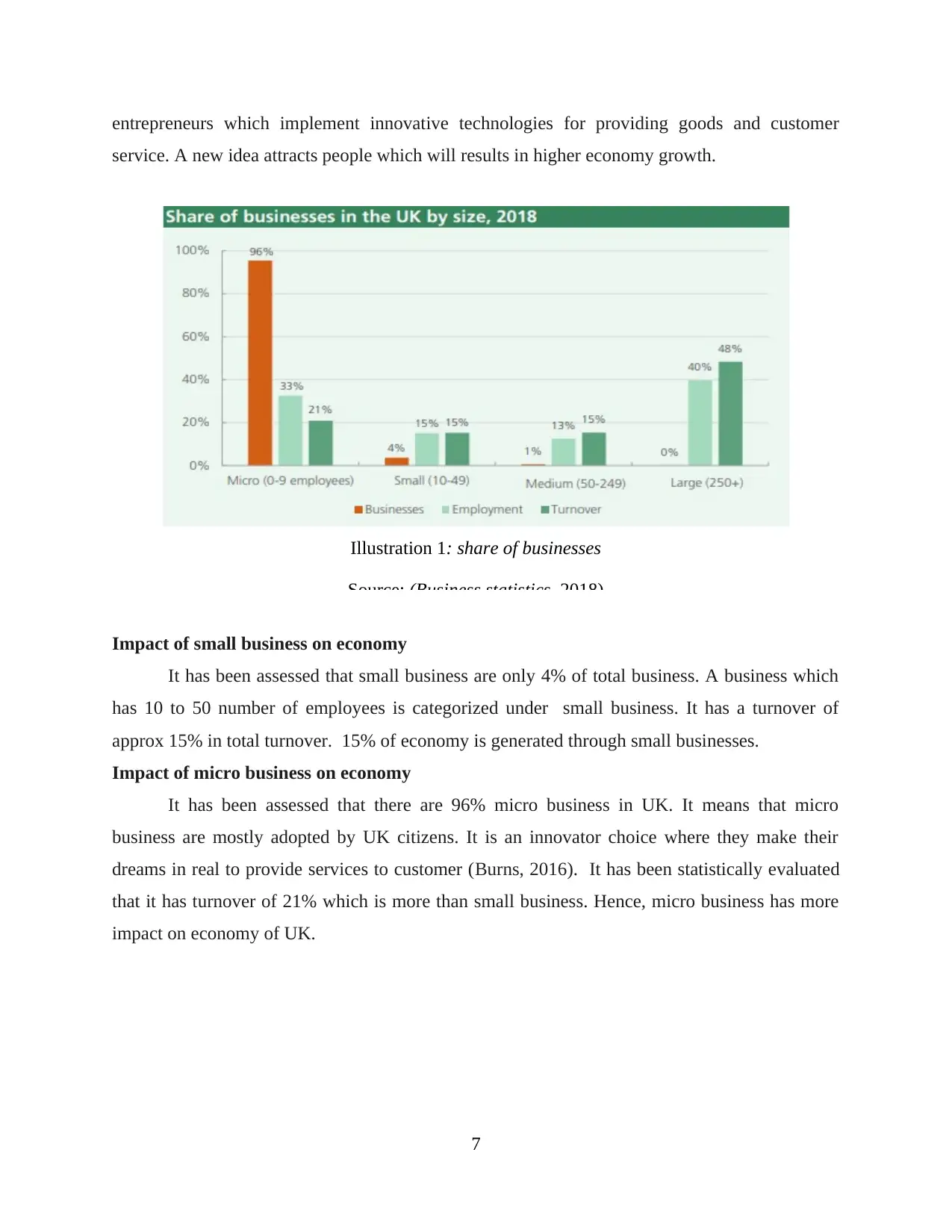
entrepreneurs which implement innovative technologies for providing goods and customer
service. A new idea attracts people which will results in higher economy growth.
Impact of small business on economy
It has been assessed that small business are only 4% of total business. A business which
has 10 to 50 number of employees is categorized under small business. It has a turnover of
approx 15% in total turnover. 15% of economy is generated through small businesses.
Impact of micro business on economy
It has been assessed that there are 96% micro business in UK. It means that micro
business are mostly adopted by UK citizens. It is an innovator choice where they make their
dreams in real to provide services to customer (Burns, 2016). It has been statistically evaluated
that it has turnover of 21% which is more than small business. Hence, micro business has more
impact on economy of UK.
7
Illustration 1: share of businesses
Source: (Business statistics, 2018)
service. A new idea attracts people which will results in higher economy growth.
Impact of small business on economy
It has been assessed that small business are only 4% of total business. A business which
has 10 to 50 number of employees is categorized under small business. It has a turnover of
approx 15% in total turnover. 15% of economy is generated through small businesses.
Impact of micro business on economy
It has been assessed that there are 96% micro business in UK. It means that micro
business are mostly adopted by UK citizens. It is an innovator choice where they make their
dreams in real to provide services to customer (Burns, 2016). It has been statistically evaluated
that it has turnover of 21% which is more than small business. Hence, micro business has more
impact on economy of UK.
7
Illustration 1: share of businesses
Source: (Business statistics, 2018)

Private sector within UK provide employment opportunities to residential people, they try
to improve position of economy and develop it more than before. 99.9 percent of UK businesses
classed as small and medium size companies, they hire 249 employees.
8
to improve position of economy and develop it more than before. 99.9 percent of UK businesses
classed as small and medium size companies, they hire 249 employees.
8
Secure Best Marks with AI Grader
Need help grading? Try our AI Grader for instant feedback on your assignments.
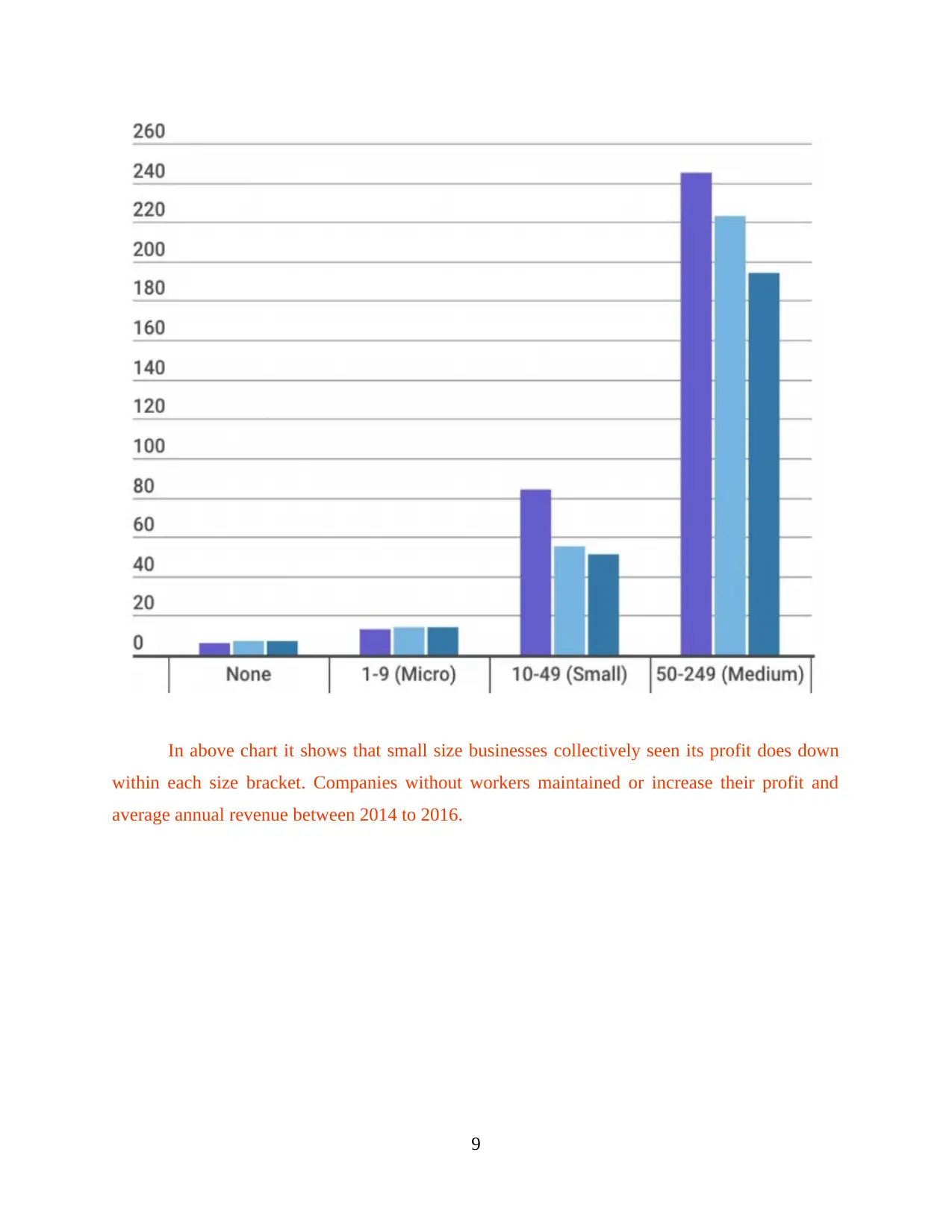
In above chart it shows that small size businesses collectively seen its profit does down
within each size bracket. Companies without workers maintained or increase their profit and
average annual revenue between 2014 to 2016.
9
within each size bracket. Companies without workers maintained or increase their profit and
average annual revenue between 2014 to 2016.
9
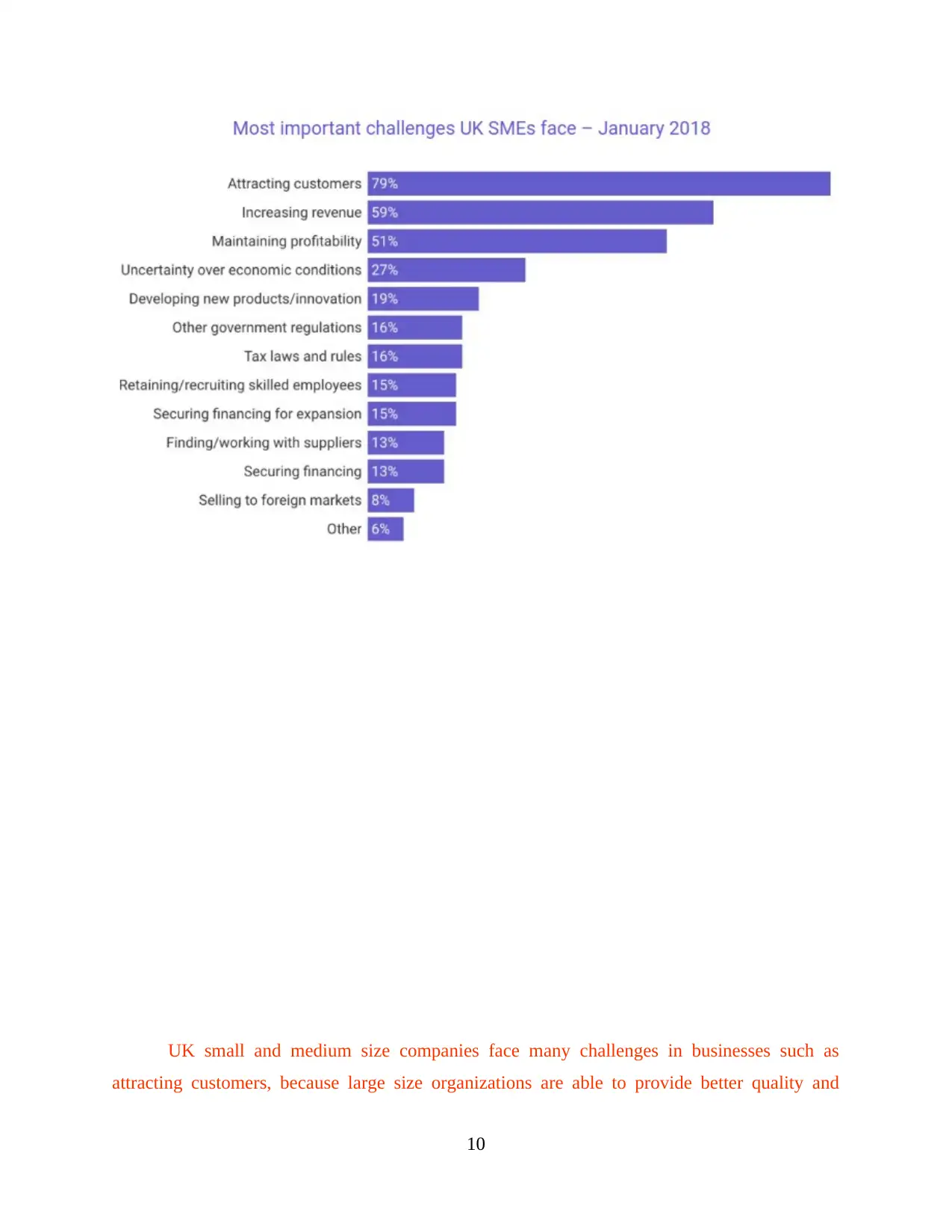
UK small and medium size companies face many challenges in businesses such as
attracting customers, because large size organizations are able to provide better quality and
10
attracting customers, because large size organizations are able to provide better quality and
10
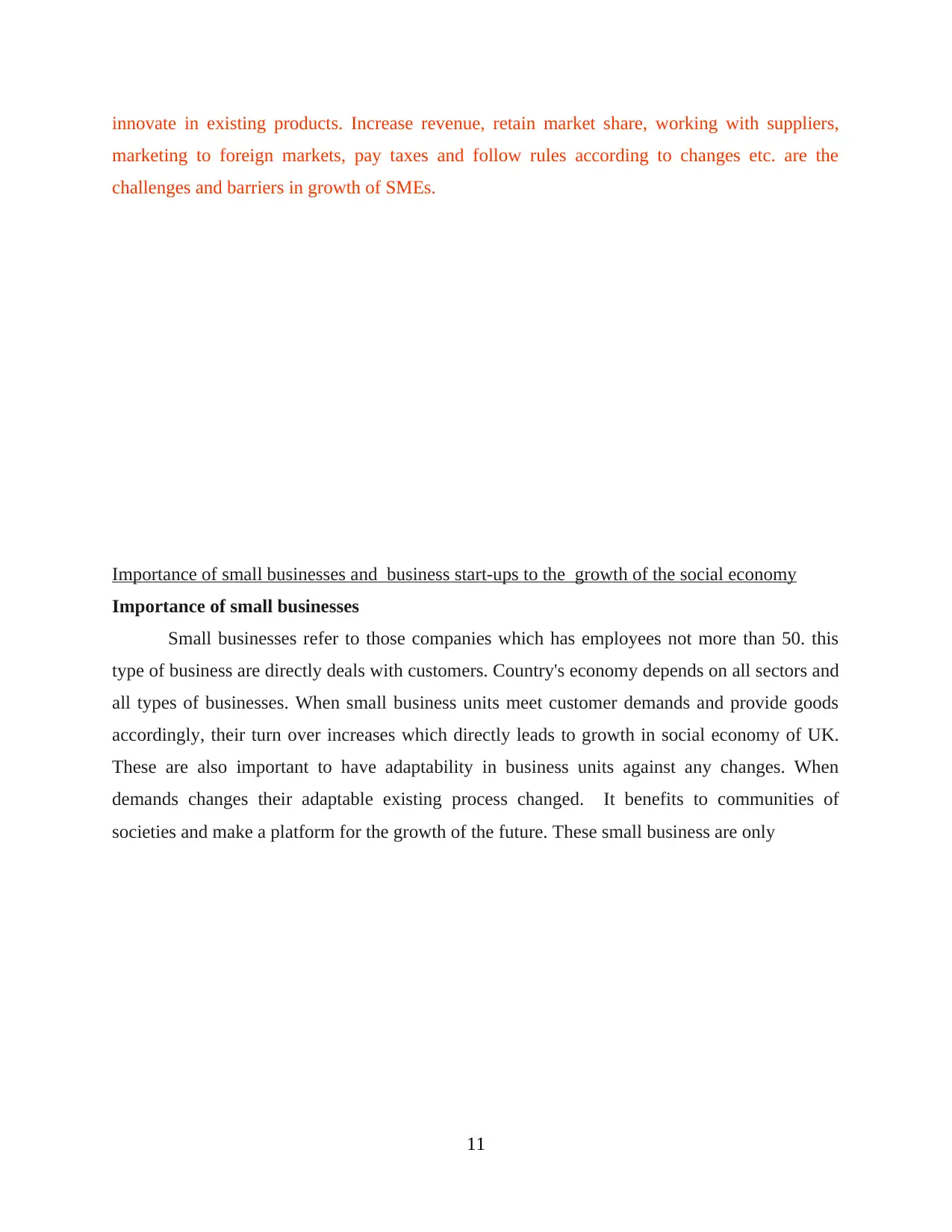
innovate in existing products. Increase revenue, retain market share, working with suppliers,
marketing to foreign markets, pay taxes and follow rules according to changes etc. are the
challenges and barriers in growth of SMEs.
Importance of small businesses and business start-ups to the growth of the social economy
Importance of small businesses
Small businesses refer to those companies which has employees not more than 50. this
type of business are directly deals with customers. Country's economy depends on all sectors and
all types of businesses. When small business units meet customer demands and provide goods
accordingly, their turn over increases which directly leads to growth in social economy of UK.
These are also important to have adaptability in business units against any changes. When
demands changes their adaptable existing process changed. It benefits to communities of
societies and make a platform for the growth of the future. These small business are only
11
marketing to foreign markets, pay taxes and follow rules according to changes etc. are the
challenges and barriers in growth of SMEs.
Importance of small businesses and business start-ups to the growth of the social economy
Importance of small businesses
Small businesses refer to those companies which has employees not more than 50. this
type of business are directly deals with customers. Country's economy depends on all sectors and
all types of businesses. When small business units meet customer demands and provide goods
accordingly, their turn over increases which directly leads to growth in social economy of UK.
These are also important to have adaptability in business units against any changes. When
demands changes their adaptable existing process changed. It benefits to communities of
societies and make a platform for the growth of the future. These small business are only
11
Paraphrase This Document
Need a fresh take? Get an instant paraphrase of this document with our AI Paraphraser
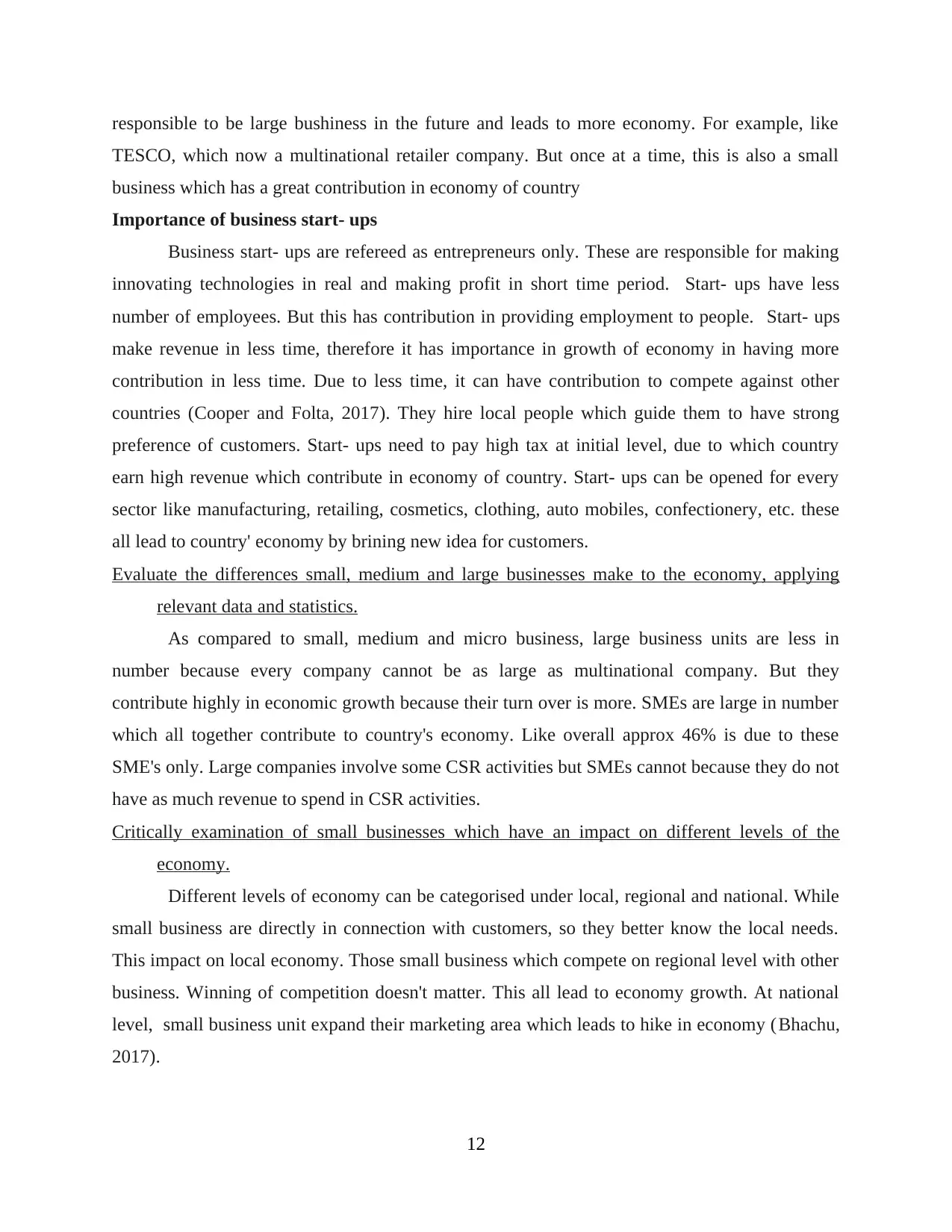
responsible to be large bushiness in the future and leads to more economy. For example, like
TESCO, which now a multinational retailer company. But once at a time, this is also a small
business which has a great contribution in economy of country
Importance of business start- ups
Business start- ups are refereed as entrepreneurs only. These are responsible for making
innovating technologies in real and making profit in short time period. Start- ups have less
number of employees. But this has contribution in providing employment to people. Start- ups
make revenue in less time, therefore it has importance in growth of economy in having more
contribution in less time. Due to less time, it can have contribution to compete against other
countries (Cooper and Folta, 2017). They hire local people which guide them to have strong
preference of customers. Start- ups need to pay high tax at initial level, due to which country
earn high revenue which contribute in economy of country. Start- ups can be opened for every
sector like manufacturing, retailing, cosmetics, clothing, auto mobiles, confectionery, etc. these
all lead to country' economy by brining new idea for customers.
Evaluate the differences small, medium and large businesses make to the economy, applying
relevant data and statistics.
As compared to small, medium and micro business, large business units are less in
number because every company cannot be as large as multinational company. But they
contribute highly in economic growth because their turn over is more. SMEs are large in number
which all together contribute to country's economy. Like overall approx 46% is due to these
SME's only. Large companies involve some CSR activities but SMEs cannot because they do not
have as much revenue to spend in CSR activities.
Critically examination of small businesses which have an impact on different levels of the
economy.
Different levels of economy can be categorised under local, regional and national. While
small business are directly in connection with customers, so they better know the local needs.
This impact on local economy. Those small business which compete on regional level with other
business. Winning of competition doesn't matter. This all lead to economy growth. At national
level, small business unit expand their marketing area which leads to hike in economy (Bhachu,
2017).
12
TESCO, which now a multinational retailer company. But once at a time, this is also a small
business which has a great contribution in economy of country
Importance of business start- ups
Business start- ups are refereed as entrepreneurs only. These are responsible for making
innovating technologies in real and making profit in short time period. Start- ups have less
number of employees. But this has contribution in providing employment to people. Start- ups
make revenue in less time, therefore it has importance in growth of economy in having more
contribution in less time. Due to less time, it can have contribution to compete against other
countries (Cooper and Folta, 2017). They hire local people which guide them to have strong
preference of customers. Start- ups need to pay high tax at initial level, due to which country
earn high revenue which contribute in economy of country. Start- ups can be opened for every
sector like manufacturing, retailing, cosmetics, clothing, auto mobiles, confectionery, etc. these
all lead to country' economy by brining new idea for customers.
Evaluate the differences small, medium and large businesses make to the economy, applying
relevant data and statistics.
As compared to small, medium and micro business, large business units are less in
number because every company cannot be as large as multinational company. But they
contribute highly in economic growth because their turn over is more. SMEs are large in number
which all together contribute to country's economy. Like overall approx 46% is due to these
SME's only. Large companies involve some CSR activities but SMEs cannot because they do not
have as much revenue to spend in CSR activities.
Critically examination of small businesses which have an impact on different levels of the
economy.
Different levels of economy can be categorised under local, regional and national. While
small business are directly in connection with customers, so they better know the local needs.
This impact on local economy. Those small business which compete on regional level with other
business. Winning of competition doesn't matter. This all lead to economy growth. At national
level, small business unit expand their marketing area which leads to hike in economy (Bhachu,
2017).
12
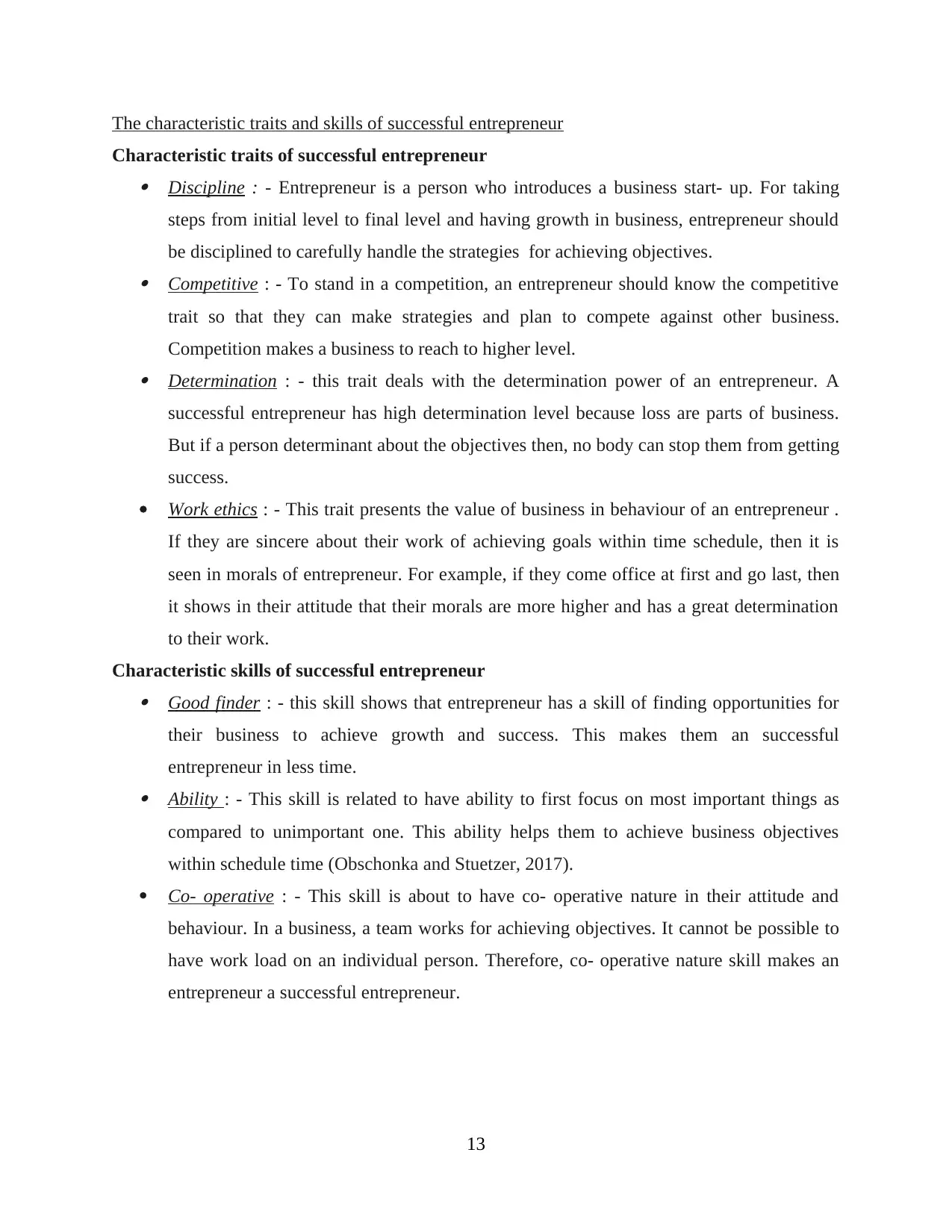
The characteristic traits and skills of successful entrepreneur
Characteristic traits of successful entrepreneur Discipline : - Entrepreneur is a person who introduces a business start- up. For taking
steps from initial level to final level and having growth in business, entrepreneur should
be disciplined to carefully handle the strategies for achieving objectives. Competitive : - To stand in a competition, an entrepreneur should know the competitive
trait so that they can make strategies and plan to compete against other business.
Competition makes a business to reach to higher level. Determination : - this trait deals with the determination power of an entrepreneur. A
successful entrepreneur has high determination level because loss are parts of business.
But if a person determinant about the objectives then, no body can stop them from getting
success.
Work ethics : - This trait presents the value of business in behaviour of an entrepreneur .
If they are sincere about their work of achieving goals within time schedule, then it is
seen in morals of entrepreneur. For example, if they come office at first and go last, then
it shows in their attitude that their morals are more higher and has a great determination
to their work.
Characteristic skills of successful entrepreneur Good finder : - this skill shows that entrepreneur has a skill of finding opportunities for
their business to achieve growth and success. This makes them an successful
entrepreneur in less time. Ability : - This skill is related to have ability to first focus on most important things as
compared to unimportant one. This ability helps them to achieve business objectives
within schedule time (Obschonka and Stuetzer, 2017).
Co- operative : - This skill is about to have co- operative nature in their attitude and
behaviour. In a business, a team works for achieving objectives. It cannot be possible to
have work load on an individual person. Therefore, co- operative nature skill makes an
entrepreneur a successful entrepreneur.
13
Characteristic traits of successful entrepreneur Discipline : - Entrepreneur is a person who introduces a business start- up. For taking
steps from initial level to final level and having growth in business, entrepreneur should
be disciplined to carefully handle the strategies for achieving objectives. Competitive : - To stand in a competition, an entrepreneur should know the competitive
trait so that they can make strategies and plan to compete against other business.
Competition makes a business to reach to higher level. Determination : - this trait deals with the determination power of an entrepreneur. A
successful entrepreneur has high determination level because loss are parts of business.
But if a person determinant about the objectives then, no body can stop them from getting
success.
Work ethics : - This trait presents the value of business in behaviour of an entrepreneur .
If they are sincere about their work of achieving goals within time schedule, then it is
seen in morals of entrepreneur. For example, if they come office at first and go last, then
it shows in their attitude that their morals are more higher and has a great determination
to their work.
Characteristic skills of successful entrepreneur Good finder : - this skill shows that entrepreneur has a skill of finding opportunities for
their business to achieve growth and success. This makes them an successful
entrepreneur in less time. Ability : - This skill is related to have ability to first focus on most important things as
compared to unimportant one. This ability helps them to achieve business objectives
within schedule time (Obschonka and Stuetzer, 2017).
Co- operative : - This skill is about to have co- operative nature in their attitude and
behaviour. In a business, a team works for achieving objectives. It cannot be possible to
have work load on an individual person. Therefore, co- operative nature skill makes an
entrepreneur a successful entrepreneur.
13
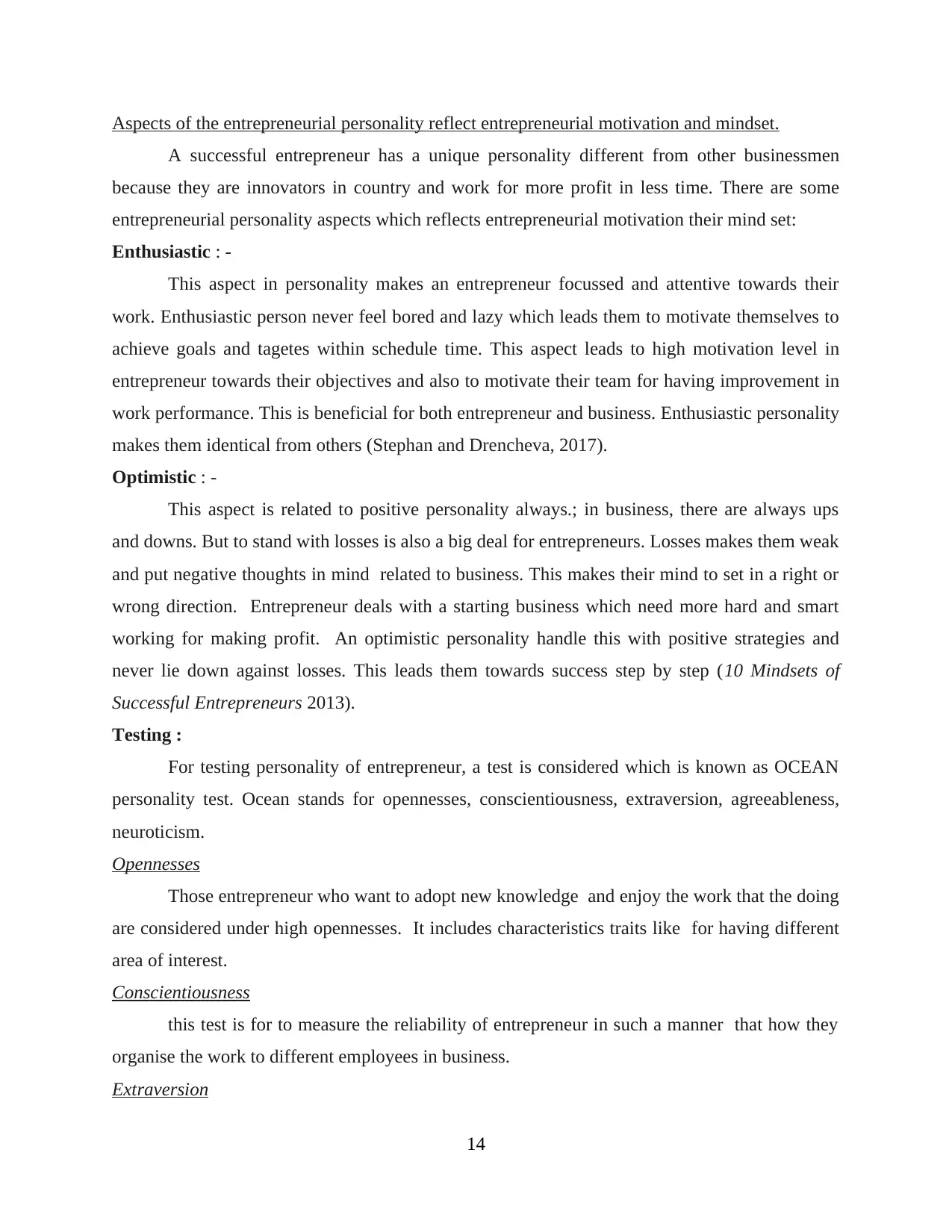
Aspects of the entrepreneurial personality reflect entrepreneurial motivation and mindset.
A successful entrepreneur has a unique personality different from other businessmen
because they are innovators in country and work for more profit in less time. There are some
entrepreneurial personality aspects which reflects entrepreneurial motivation their mind set:
Enthusiastic : -
This aspect in personality makes an entrepreneur focussed and attentive towards their
work. Enthusiastic person never feel bored and lazy which leads them to motivate themselves to
achieve goals and tagetes within schedule time. This aspect leads to high motivation level in
entrepreneur towards their objectives and also to motivate their team for having improvement in
work performance. This is beneficial for both entrepreneur and business. Enthusiastic personality
makes them identical from others (Stephan and Drencheva, 2017).
Optimistic : -
This aspect is related to positive personality always.; in business, there are always ups
and downs. But to stand with losses is also a big deal for entrepreneurs. Losses makes them weak
and put negative thoughts in mind related to business. This makes their mind to set in a right or
wrong direction. Entrepreneur deals with a starting business which need more hard and smart
working for making profit. An optimistic personality handle this with positive strategies and
never lie down against losses. This leads them towards success step by step (10 Mindsets of
Successful Entrepreneurs 2013).
Testing :
For testing personality of entrepreneur, a test is considered which is known as OCEAN
personality test. Ocean stands for opennesses, conscientiousness, extraversion, agreeableness,
neuroticism.
Opennesses
Those entrepreneur who want to adopt new knowledge and enjoy the work that the doing
are considered under high opennesses. It includes characteristics traits like for having different
area of interest.
Conscientiousness
this test is for to measure the reliability of entrepreneur in such a manner that how they
organise the work to different employees in business.
Extraversion
14
A successful entrepreneur has a unique personality different from other businessmen
because they are innovators in country and work for more profit in less time. There are some
entrepreneurial personality aspects which reflects entrepreneurial motivation their mind set:
Enthusiastic : -
This aspect in personality makes an entrepreneur focussed and attentive towards their
work. Enthusiastic person never feel bored and lazy which leads them to motivate themselves to
achieve goals and tagetes within schedule time. This aspect leads to high motivation level in
entrepreneur towards their objectives and also to motivate their team for having improvement in
work performance. This is beneficial for both entrepreneur and business. Enthusiastic personality
makes them identical from others (Stephan and Drencheva, 2017).
Optimistic : -
This aspect is related to positive personality always.; in business, there are always ups
and downs. But to stand with losses is also a big deal for entrepreneurs. Losses makes them weak
and put negative thoughts in mind related to business. This makes their mind to set in a right or
wrong direction. Entrepreneur deals with a starting business which need more hard and smart
working for making profit. An optimistic personality handle this with positive strategies and
never lie down against losses. This leads them towards success step by step (10 Mindsets of
Successful Entrepreneurs 2013).
Testing :
For testing personality of entrepreneur, a test is considered which is known as OCEAN
personality test. Ocean stands for opennesses, conscientiousness, extraversion, agreeableness,
neuroticism.
Opennesses
Those entrepreneur who want to adopt new knowledge and enjoy the work that the doing
are considered under high opennesses. It includes characteristics traits like for having different
area of interest.
Conscientiousness
this test is for to measure the reliability of entrepreneur in such a manner that how they
organise the work to different employees in business.
Extraversion
14
Secure Best Marks with AI Grader
Need help grading? Try our AI Grader for instant feedback on your assignments.
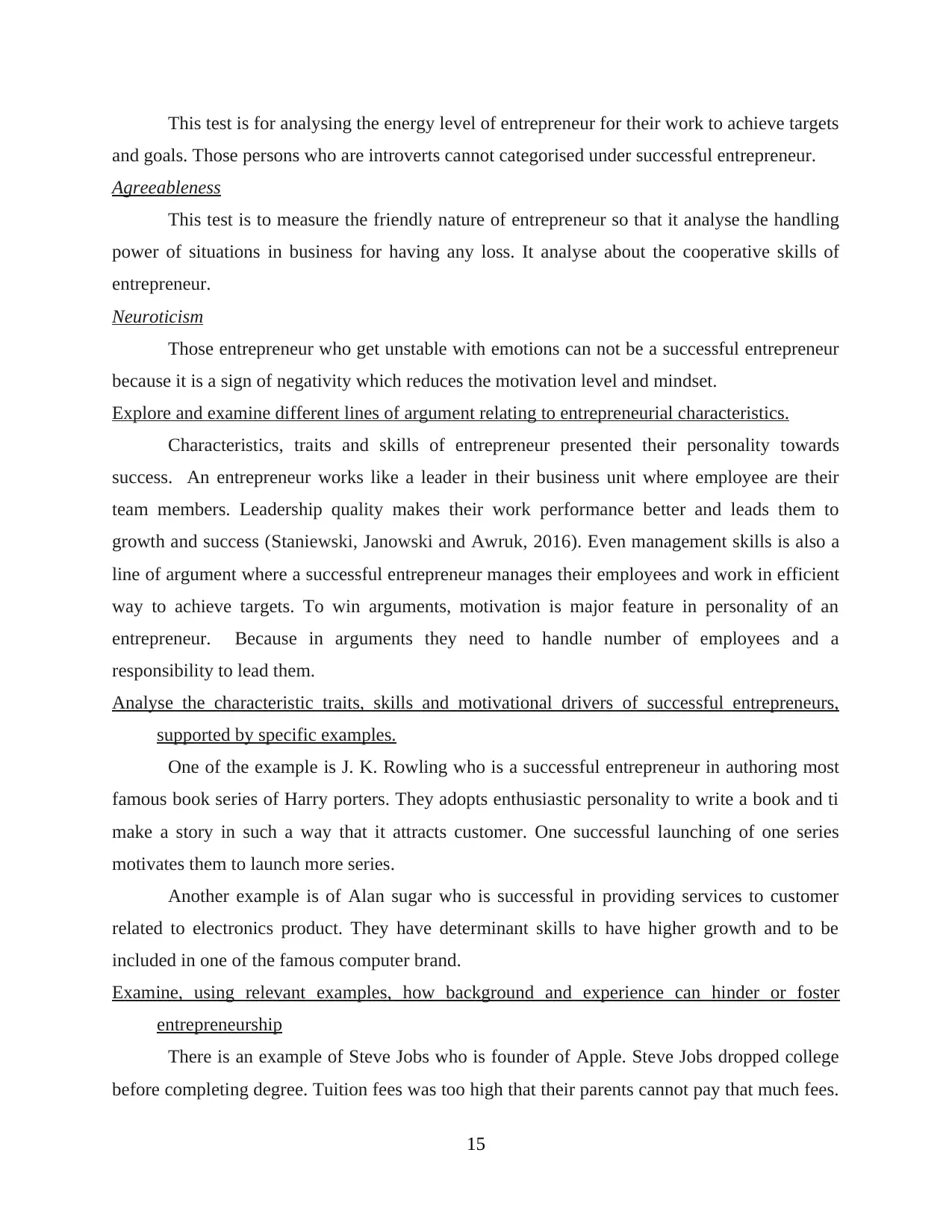
This test is for analysing the energy level of entrepreneur for their work to achieve targets
and goals. Those persons who are introverts cannot categorised under successful entrepreneur.
Agreeableness
This test is to measure the friendly nature of entrepreneur so that it analyse the handling
power of situations in business for having any loss. It analyse about the cooperative skills of
entrepreneur.
Neuroticism
Those entrepreneur who get unstable with emotions can not be a successful entrepreneur
because it is a sign of negativity which reduces the motivation level and mindset.
Explore and examine different lines of argument relating to entrepreneurial characteristics.
Characteristics, traits and skills of entrepreneur presented their personality towards
success. An entrepreneur works like a leader in their business unit where employee are their
team members. Leadership quality makes their work performance better and leads them to
growth and success (Staniewski, Janowski and Awruk, 2016). Even management skills is also a
line of argument where a successful entrepreneur manages their employees and work in efficient
way to achieve targets. To win arguments, motivation is major feature in personality of an
entrepreneur. Because in arguments they need to handle number of employees and a
responsibility to lead them.
Analyse the characteristic traits, skills and motivational drivers of successful entrepreneurs,
supported by specific examples.
One of the example is J. K. Rowling who is a successful entrepreneur in authoring most
famous book series of Harry porters. They adopts enthusiastic personality to write a book and ti
make a story in such a way that it attracts customer. One successful launching of one series
motivates them to launch more series.
Another example is of Alan sugar who is successful in providing services to customer
related to electronics product. They have determinant skills to have higher growth and to be
included in one of the famous computer brand.
Examine, using relevant examples, how background and experience can hinder or foster
entrepreneurship
There is an example of Steve Jobs who is founder of Apple. Steve Jobs dropped college
before completing degree. Tuition fees was too high that their parents cannot pay that much fees.
15
and goals. Those persons who are introverts cannot categorised under successful entrepreneur.
Agreeableness
This test is to measure the friendly nature of entrepreneur so that it analyse the handling
power of situations in business for having any loss. It analyse about the cooperative skills of
entrepreneur.
Neuroticism
Those entrepreneur who get unstable with emotions can not be a successful entrepreneur
because it is a sign of negativity which reduces the motivation level and mindset.
Explore and examine different lines of argument relating to entrepreneurial characteristics.
Characteristics, traits and skills of entrepreneur presented their personality towards
success. An entrepreneur works like a leader in their business unit where employee are their
team members. Leadership quality makes their work performance better and leads them to
growth and success (Staniewski, Janowski and Awruk, 2016). Even management skills is also a
line of argument where a successful entrepreneur manages their employees and work in efficient
way to achieve targets. To win arguments, motivation is major feature in personality of an
entrepreneur. Because in arguments they need to handle number of employees and a
responsibility to lead them.
Analyse the characteristic traits, skills and motivational drivers of successful entrepreneurs,
supported by specific examples.
One of the example is J. K. Rowling who is a successful entrepreneur in authoring most
famous book series of Harry porters. They adopts enthusiastic personality to write a book and ti
make a story in such a way that it attracts customer. One successful launching of one series
motivates them to launch more series.
Another example is of Alan sugar who is successful in providing services to customer
related to electronics product. They have determinant skills to have higher growth and to be
included in one of the famous computer brand.
Examine, using relevant examples, how background and experience can hinder or foster
entrepreneurship
There is an example of Steve Jobs who is founder of Apple. Steve Jobs dropped college
before completing degree. Tuition fees was too high that their parents cannot pay that much fees.
15
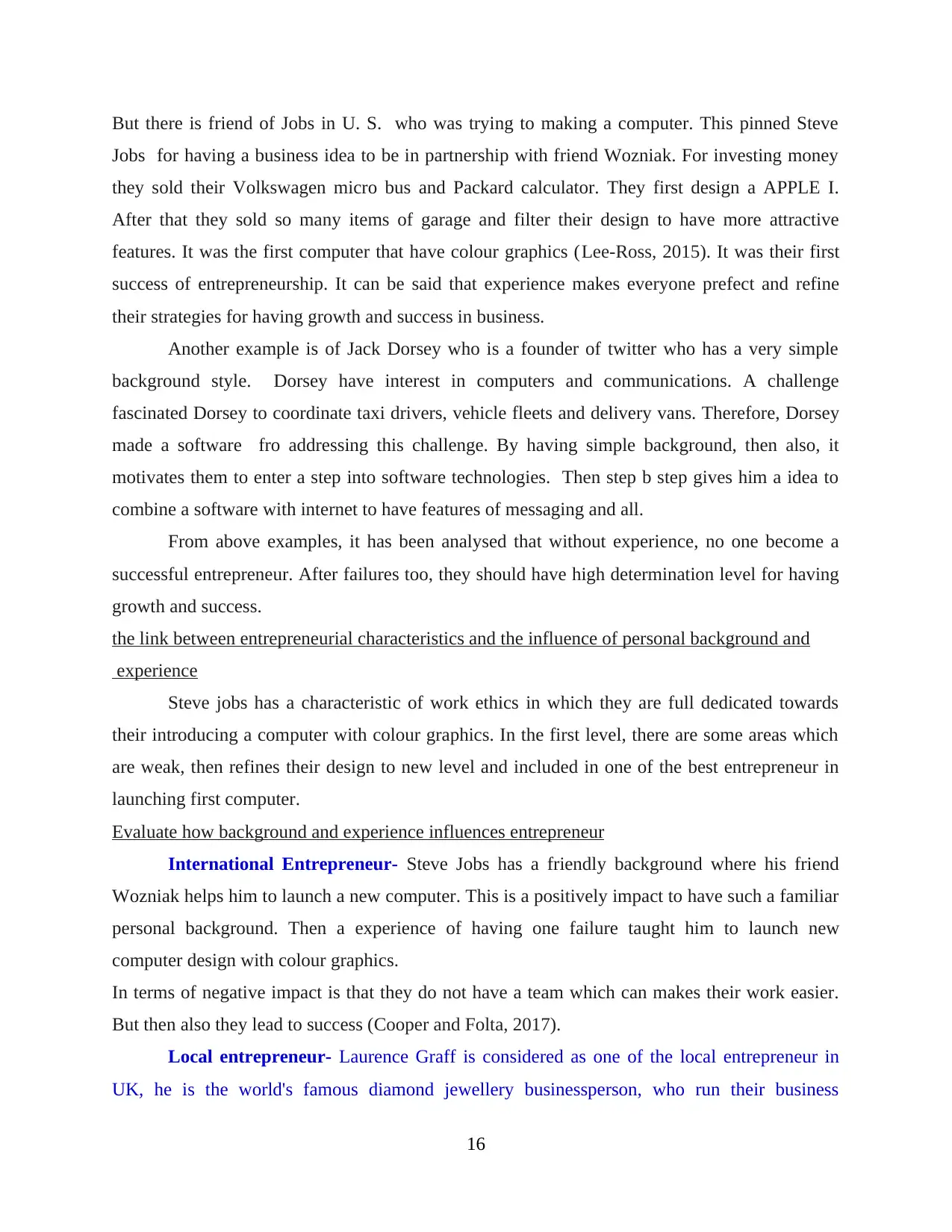
But there is friend of Jobs in U. S. who was trying to making a computer. This pinned Steve
Jobs for having a business idea to be in partnership with friend Wozniak. For investing money
they sold their Volkswagen micro bus and Packard calculator. They first design a APPLE I.
After that they sold so many items of garage and filter their design to have more attractive
features. It was the first computer that have colour graphics (Lee-Ross, 2015). It was their first
success of entrepreneurship. It can be said that experience makes everyone prefect and refine
their strategies for having growth and success in business.
Another example is of Jack Dorsey who is a founder of twitter who has a very simple
background style. Dorsey have interest in computers and communications. A challenge
fascinated Dorsey to coordinate taxi drivers, vehicle fleets and delivery vans. Therefore, Dorsey
made a software fro addressing this challenge. By having simple background, then also, it
motivates them to enter a step into software technologies. Then step b step gives him a idea to
combine a software with internet to have features of messaging and all.
From above examples, it has been analysed that without experience, no one become a
successful entrepreneur. After failures too, they should have high determination level for having
growth and success.
the link between entrepreneurial characteristics and the influence of personal background and
experience
Steve jobs has a characteristic of work ethics in which they are full dedicated towards
their introducing a computer with colour graphics. In the first level, there are some areas which
are weak, then refines their design to new level and included in one of the best entrepreneur in
launching first computer.
Evaluate how background and experience influences entrepreneur
International Entrepreneur- Steve Jobs has a friendly background where his friend
Wozniak helps him to launch a new computer. This is a positively impact to have such a familiar
personal background. Then a experience of having one failure taught him to launch new
computer design with colour graphics.
In terms of negative impact is that they do not have a team which can makes their work easier.
But then also they lead to success (Cooper and Folta, 2017).
Local entrepreneur- Laurence Graff is considered as one of the local entrepreneur in
UK, he is the world's famous diamond jewellery businessperson, who run their business
16
Jobs for having a business idea to be in partnership with friend Wozniak. For investing money
they sold their Volkswagen micro bus and Packard calculator. They first design a APPLE I.
After that they sold so many items of garage and filter their design to have more attractive
features. It was the first computer that have colour graphics (Lee-Ross, 2015). It was their first
success of entrepreneurship. It can be said that experience makes everyone prefect and refine
their strategies for having growth and success in business.
Another example is of Jack Dorsey who is a founder of twitter who has a very simple
background style. Dorsey have interest in computers and communications. A challenge
fascinated Dorsey to coordinate taxi drivers, vehicle fleets and delivery vans. Therefore, Dorsey
made a software fro addressing this challenge. By having simple background, then also, it
motivates them to enter a step into software technologies. Then step b step gives him a idea to
combine a software with internet to have features of messaging and all.
From above examples, it has been analysed that without experience, no one become a
successful entrepreneur. After failures too, they should have high determination level for having
growth and success.
the link between entrepreneurial characteristics and the influence of personal background and
experience
Steve jobs has a characteristic of work ethics in which they are full dedicated towards
their introducing a computer with colour graphics. In the first level, there are some areas which
are weak, then refines their design to new level and included in one of the best entrepreneur in
launching first computer.
Evaluate how background and experience influences entrepreneur
International Entrepreneur- Steve Jobs has a friendly background where his friend
Wozniak helps him to launch a new computer. This is a positively impact to have such a familiar
personal background. Then a experience of having one failure taught him to launch new
computer design with colour graphics.
In terms of negative impact is that they do not have a team which can makes their work easier.
But then also they lead to success (Cooper and Folta, 2017).
Local entrepreneur- Laurence Graff is considered as one of the local entrepreneur in
UK, he is the world's famous diamond jewellery businessperson, who run their business
16
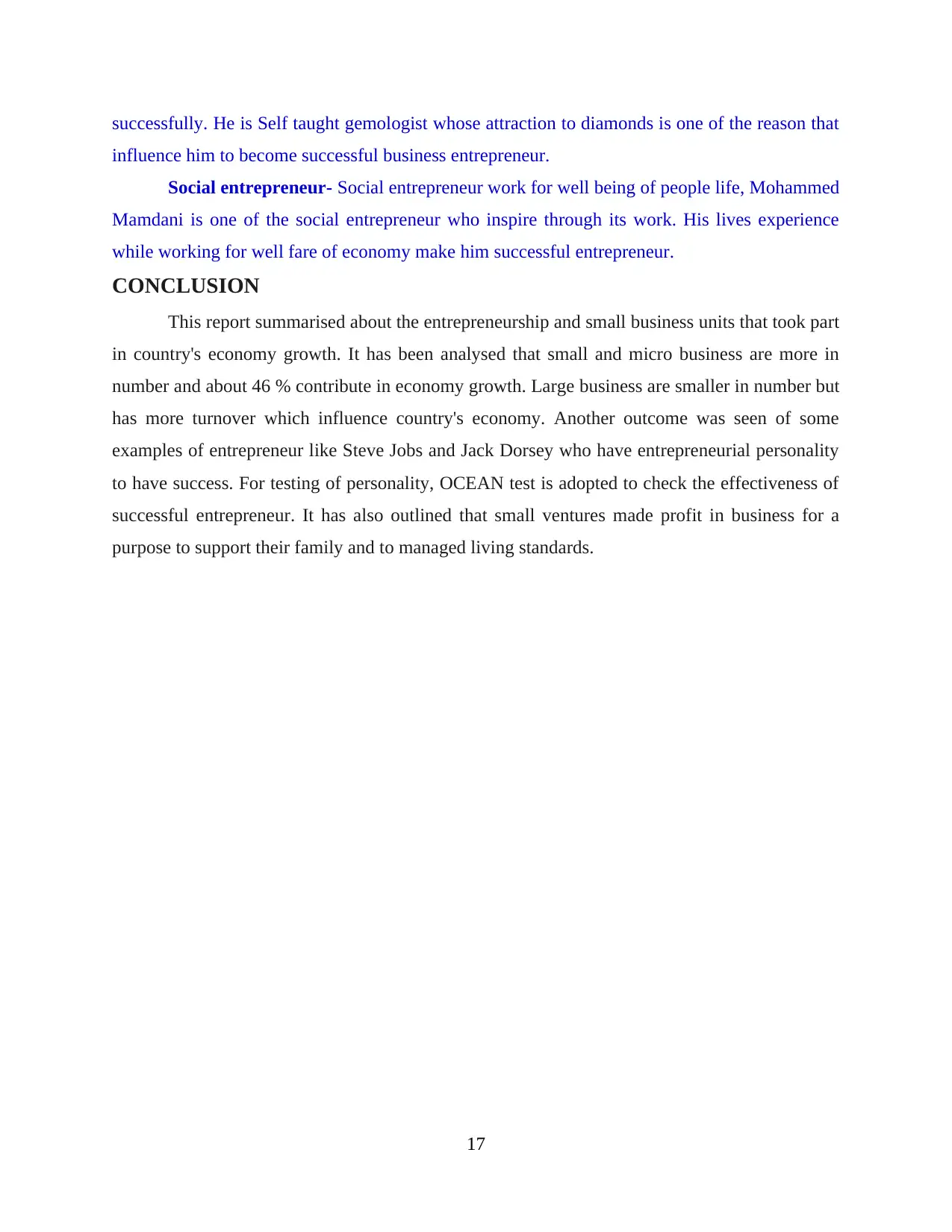
successfully. He is Self taught gemologist whose attraction to diamonds is one of the reason that
influence him to become successful business entrepreneur.
Social entrepreneur- Social entrepreneur work for well being of people life, Mohammed
Mamdani is one of the social entrepreneur who inspire through its work. His lives experience
while working for well fare of economy make him successful entrepreneur.
CONCLUSION
This report summarised about the entrepreneurship and small business units that took part
in country's economy growth. It has been analysed that small and micro business are more in
number and about 46 % contribute in economy growth. Large business are smaller in number but
has more turnover which influence country's economy. Another outcome was seen of some
examples of entrepreneur like Steve Jobs and Jack Dorsey who have entrepreneurial personality
to have success. For testing of personality, OCEAN test is adopted to check the effectiveness of
successful entrepreneur. It has also outlined that small ventures made profit in business for a
purpose to support their family and to managed living standards.
17
influence him to become successful business entrepreneur.
Social entrepreneur- Social entrepreneur work for well being of people life, Mohammed
Mamdani is one of the social entrepreneur who inspire through its work. His lives experience
while working for well fare of economy make him successful entrepreneur.
CONCLUSION
This report summarised about the entrepreneurship and small business units that took part
in country's economy growth. It has been analysed that small and micro business are more in
number and about 46 % contribute in economy growth. Large business are smaller in number but
has more turnover which influence country's economy. Another outcome was seen of some
examples of entrepreneur like Steve Jobs and Jack Dorsey who have entrepreneurial personality
to have success. For testing of personality, OCEAN test is adopted to check the effectiveness of
successful entrepreneur. It has also outlined that small ventures made profit in business for a
purpose to support their family and to managed living standards.
17
1 out of 19
Related Documents
Your All-in-One AI-Powered Toolkit for Academic Success.
+13062052269
info@desklib.com
Available 24*7 on WhatsApp / Email
![[object Object]](/_next/static/media/star-bottom.7253800d.svg)
Unlock your academic potential
© 2024 | Zucol Services PVT LTD | All rights reserved.





